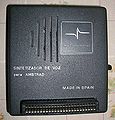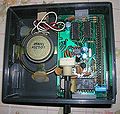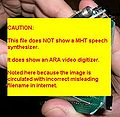Difference between revisions of "MHT Speech Synthesizer"
(→Pictures) |
|||
| Line 28: | Line 28: | ||
<gallery caption="MHT Speech"> | <gallery caption="MHT Speech"> | ||
| − | File:MHT-sintetizdor_de_voz-001.jpg | + | File:MHT-sintetizdor_de_voz-001.jpg|Outside |
| − | File:MHT-sintetizdor_de_voz-003.jpg | + | File:MHT-sintetizdor_de_voz-003.jpg|Inside |
| − | File:MHT-sintetizdor_de_voz-004.jpg | + | File:MHT-sintetizdor_de_voz-004.jpg|Component Side |
| − | File:MHT-sintetizdor_de_voz-007.jpg | + | File:MHT-sintetizdor_de_voz-007.jpg|Solder Side |
| + | File:NoPicture.gif|Part number on GI chip | ||
| + | File:NoPicture.gif|Part number on oscillator | ||
</gallery> | </gallery> | ||
| − | + | The part numbers on the chips seem to be scratched-off (or covered by paint, or is it just old glue from stickers?). The "GI" logo on the large chip implies that it is the popular General Instrument [[SP0256]] speech chip, probably the standard -AL2 version (the ending L2 may be still visible? not sure there - on the photo it vanishes under the pot axis). The clock frequency of the oscillator isn't visible (from the perspective from where the photos were taken). | |
| − | The part numbers on the chips seem to be scratched-off (or covered by paint, or is it just old glue | + | |
The GNDed pins somewhat confirm that it is a SP0256 (Pin1=Supply GND, Pin10,11=A8,A9, ie. only 6bit allophone numbers used). | The GNDed pins somewhat confirm that it is a SP0256 (Pin1=Supply GND, Pin10,11=A8,A9, ie. only 6bit allophone numbers used). | ||
Revision as of 16:27, 12 January 2010
MHT Speech Synthesizer aka Sintetizador de voz (MHT Ingenieros)
Contents
Technical
Probably uses a SP0256(-AL2?) chip.
- The I/O addresses are unknown.
- The clock frequency is unknown (as shown on the photo, it uses an oscillator, ie. NOT the 4MHz signal on the expansion port).
Port ????h READ:
bit? Status 1 (0=Speech Busy, 1=Ready/Halted) (SBY Pin, Speech Busy) bit? Status 2 (0=Ready to Receive Data, 1=Busy) (/LRQ Pin, Load Request) bit?-? Not used (garbage, probably usually highz)
Port ????h WRITE:
bit7-6 Reserved (should be be zero, though SP0256 Pins10-11 are GNDed) bit5-0 Allophone number ;data can be send when Status.Bit?=0
Supported software
- No (known) software?
Pictures
- MHT Speech
The part numbers on the chips seem to be scratched-off (or covered by paint, or is it just old glue from stickers?). The "GI" logo on the large chip implies that it is the popular General Instrument SP0256 speech chip, probably the standard -AL2 version (the ending L2 may be still visible? not sure there - on the photo it vanishes under the pot axis). The clock frequency of the oscillator isn't visible (from the perspective from where the photos were taken). The GNDed pins somewhat confirm that it is a SP0256 (Pin1=Supply GND, Pin10,11=A8,A9, ie. only 6bit allophone numbers used).
Other Pictures
- Probably NOT another version of the MHT Speech Synthesizer?
Not sure where these photos come from, why they are here, and if they do actually show a speech synthesizer. There isn't much visible, the upper board contains an enormous amount of logic chips (no idea what for). The lower board contains even more logic chips (strange), and two big chips, which might be ROM, or RAM, or maybe a speech chip...? Despite of their filenames, these pictures probably do NOT show a speech synthesizer. Though with the 3.5mm socket, it may be some kind of audio output or audio input device...?
Other CPC Speech Synthesizers
- Amstrad SSA-1 Speech Synthesizer (SP0256 based)
- Dk'tronics Speech Synthesizer (SP0256 based)
- TMPI speech synthetizer (MEA8000 based)
- Software Speech Synthesizers (Software based)






